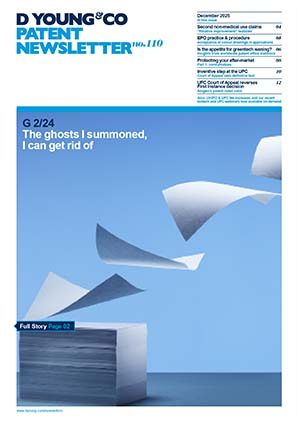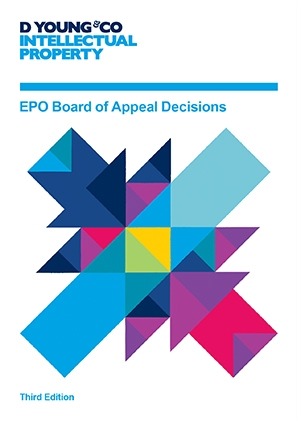Potential EPO Enlarged Board of Appeal referral: post-published data to support inventive step?
In a likely referral to the EPO’s Enlarged Board of Appeal (the EPO’s highest legal authority), the Enlarged Board of Appeal may be asked to consider the question of whether data generated after the filing date of a patent application (“post-published” data) can be used as the sole basis for proving inventive step.
Latest update on this subject
G2/21: Enlarged Board of Appeal issues its decision 24 March 2023.
Read moreThe issue of whether post-published data can be used to demonstrated inventive step before the European Patent Office (EPO) has been a controversial one for many years. This issue originated with Board of Appeal decision T1329/04, in which the Board of Appeal ruled that the technical effect underlying inventive step must be “plausible” from the patent application as filed: if the effect was not considered plausible, post-published data could not be relied upon as the sole basis for inventive step. Other, later, Board of Appeal decisions beginning with T0578/06, took a more liberal view and required “plausibility” in the application as filed only when there were substantiated reasons to doubt the alleged technical effect. “Plausibility” is not a criterion for patentability in its own right, but a threshold which must be reached in order for post-published data to be admissible.
After many decisions both ways in the intervening years, the Board of Appeal in T0116/18 has seemingly decided this issue merits consideration by the Enlarged Board of Appeal.
T0116/18 concerned the opposition of a granted patent with independent claims directed towards the composition of an insecticide comprising two or more compounds. The opponent argued that the data in the application as filed did not demonstrate the synergistic effect of the claimed combination of compounds across the entire scope of the claim and therefore could not be considered for the establishing of inventive step across the scope of the claim. In response, the patent proprietor argued that the effectiveness was corroborated by a number of cited documents which were published after the effective date of the patent, and that the effect could therefore be considered.
As indicated above, the EPO considers the relationship between “plausibility” of the technical effect in the application as filed together with the issue of post-published data being used to support an inventive step. This was reflected in the patent proprietor’s argument that "there was no scientific reason to doubt the synergistic effect of the composition over the full scope of the claim" (following the line of case law beginning with T0578/06), even if it was only demonstrated for a narrower range. In other words, it was argued that even if the proof of the effect across the entire claim scope was only available at a later date, it was still sufficient that the effect was plausible at the time of filing.
The Board of Appeal took the provisional view that if the post-published data alone cannot be used as proof of the technical effect, and the technical effect is not supported by data within the application as filed, the degree of “plausibility” which the skilled person would consider from the application as filed becomes critical. In particular, the Board of Appeal questioned as to whether the correct test for whether post-published data can be used as proof of the technical effect was whether that technical effect must be either:
- plausible based upon the information in the application as filed, or
- at least not implausible (that is, no reason to doubt plausibility) based upon the information in the application as filed.
The Board of Appeal therefore formulated the following draft questions for referral to the Enlarged Board of Appeal:
"If for acknowledgement of inventive step the patent proprietor relies on a technical effect and has submitted data or other evidence to proof such effect, such data or other evidence having been generated only after the priority or filing date of the patent (post-published data):
- Should an exception to the principle of free evaluation of evidence (see e.g. G 1/12 reasons 31) be accepted in that the post-published data must be disregarded on the ground that the proof of the effect rests exclusively on such post-published data?"
- If the answer is yes (post-published data must be disregarded if the proof of the effect rests exclusively on these data): can post-published data be taken into consideration if based on the information in the patent application the skilled person at the relevant date would have considered the effect plausible (ab initio plausibility)?"
- If the answer to the first question is yes (post-published data must be disregarded if the proof of the effect rests exclusively on these data): can post-published data be taken into consideration if based on the information in the patent application the skilled person at the relevant date would have seen no reason to consider the effect implausible (ab initio implausibility)?"
The parties will have the chance to comment on the referred questions during the further procedure before the Board of Appeal before it formally refers the matter to the Enlarged Board. Typically, matters referred to the Enlarged Board take one to two years from formal referral to the Enlarged Board of Appeal issuing its decision.
The outcome of a referral may result in a significant change of practice for those filing applications at the EPO across all technical fields. Specifically, the amount of evidence that may need to be included in an application as filed may need to be increased if the Enlarged Board of Appeal’s decision restricts opportunities to rely upon post-published data as evidence of inventive step. It may be the case that an increased amount of data will be required when drafting a new application, or a more considered selection of data so as to make it plausible that a technical effect is achieved across as broad a claim scope as possible.
We will continue to monitor the progress of this case before the Enlarged Board of Appeal and keep you informed of developments.


